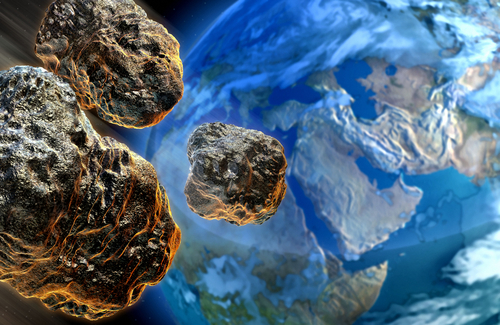Must solve the threat from space
Scientists say the great risk of meteorites may occur in less than 20 years and the mission to block meteorites needs to be globally adopted.
As recommended by the Space Explorers Association (ASE), the UN will meet in February to discuss this issue.
A recent ASE report outlines the dangers posed by meteorites in history.
The impact of meteorite on Earth 65 million years ago was probably the cause of the extinction of the dinosaurs, and the meteorite impact in 1908 caused a 2,000km2 fire in Siberia, enough big to sink a New York-sized city in a sea of fire.
The Apophis meteorite is expected to pass close to Earth and is likely to hit Earth in less than 20 years, although this ability is not large. If hitting Earth, Apophis can cause an explosion equivalent to 500 million tons of explosives, at least 100 times more powerful than a meteorite falling into Siberia.

Most meteorites entering the atmosphere are small and ignite before reaching the ground.Photo: dailygalaxy.com
Prof. Carther, a leading UN scientist, said that this threat cannot be underestimated, as it will cause huge casualties.
The United Nations also broadly agrees to take action, but in some ways it is still in discussion. Professor Crowther said that in February, a UN action group will discuss ASE's report to come up with a response plan.
According to the ASE report, most meteorites entering the atmosphere are small and ignite before reaching the ground. Only large meteors - about 200 meters across or more - need to deflect them to avoid hitting the Earth.
Researchers have proposed a number of directions. The most extreme way is to use a spacecraft to crash into a meteorite to make it deflect, or cause a nuclear explosion. According to them, the sooner the threat is solved, the less need for a drastic action path.
Professor Crowther said that in many situations, it is possible to use the natural force of gravity to deflect meteorites: 'We can use the natural attraction of a probe vessel and slowly pull that object. go elsewhere '.
If that was done far enough away from Earth, he said, it would be possible to alter the orbit of meteorites more or less.
ASE is proposing to coordinate scientific research with a global strategy. However, the consensus in the scientific world is easy, but the consensus in the political world still has to wait longer.
The problem is who will act and act under the authority of which organization. According to GS Crowther, it is clear that the UN will play a major role in this issue within the next two or three years. "The key is to do this before it's too late," he said.
- Space waste - threat exists
- Solve the threat from the network
- Establishing Vietnam Space Committee
- Earthquakes are a serious threat to humanity
- 'Booming' jellyfish - a threat to the ocean
- Worms 'exploration' space
- If you solve this puzzle, you are even better than an architect
- 'Domain kiting' - New threat on the Internet
- Russia developed a system to eliminate cosmic garbage
- America revealed the ultimate weapon against unmanned aircraft
- Man can solve problems in the unconscious
- Find the solution to one of the most difficult math problems
 Van Allen's belt and evidence that the Apollo 11 mission to the Moon was myth
Van Allen's belt and evidence that the Apollo 11 mission to the Moon was myth The levels of civilization in the universe (Kardashev scale)
The levels of civilization in the universe (Kardashev scale) Today Mars, the sun and the Earth are aligned
Today Mars, the sun and the Earth are aligned The Amazon owner announced a secret plan to build a space base for thousands of people
The Amazon owner announced a secret plan to build a space base for thousands of people